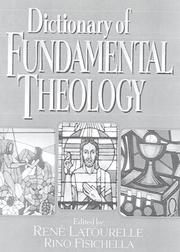
Dictionary of Fundamental Theology
By Rene Latourelle
Subjects: Theology, dictionaries
Description: Fundamental theology is a postwar Roman Catholic term for apologetics, and is not to be confused with Protestant fundamentalism. The main concerns of this work are "Christian revelation; its credibility; the response of faith; relations with other Christian communities and other religions; and the relationship of Christian revelation to history, philosophy, the sciences, culture and language." This dictionary replaces the Dictionnaire Apolog{{‚}e}Etique de la Foi Catholique by A. d'Al{Š}es begun about a hundred years ago. It is a translation of the 1990 Italian Dizionario di Teologia Fondamentale. Fundamental theology takes into account and addresses today's religious pluralism, the indifference of many people to Christianity, and science as an element in contemporary thought. Fundamental theology has an attitude of dialogue rather than confrontation. The articles Ecumenism, Anglicanism, Lutheranism, Evangelical Churches, Judaism, Islam, and Marxism demonstrate the dialogical approach. Contemporary concern includes anthropology, communication, feminism, the New Age, and the relation between imagination and theology and between literature and theology. There are articles on the great Catholic apologeticists--Augustine, Pascal, Newman, Teilhard de Chardin, as well as on other important Catholics. The 223 signed articles are written by 93 contributors, 37 of whom (including the editors) teach at the Pontifical Gregorian University in Rome. Other contributors, whose affiliations are also given, represent 15 countries. Articles are long and thorough. Many are divided into sections, and most provide bibliographies. Although written clearly, articles assume familiarity with the complicated body of thought involved and its specialized vocabulary. Two indexes, analytic and systematic, assist in pulling together related topics. The book is addressed to students of universities and theology schools, clergy, and the layperson--"all who are eager to reflect on the ultimate meaning of the human condition." Libraries of theology schools and universities with strong religion or philosophy departments would certainly want to consider this landmark work, as would some church libraries.
Comments
You must log in to leave comments.